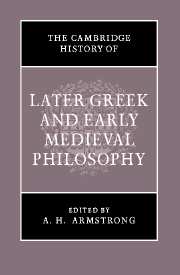Book contents
- Frontmatter
- Chapter 1 Introductory
- Part 1 GREEK PHILOSOPHY FROM PLATO TO PLOTINUS
- Part II PHILO AND THE BEGINNINGS OF CHRISTIAN THOUGHT
- Part III PLOTINUS
- Part IV THE LATER NEOPLATONISTS
- Part V MARIUS VICTORINUS AND AUGUSTINE
- Chapter 20 Marius Victorinus
- Chapter 21 Augustine. Biographical introduction: Christianity and philosophy
- Chapter 22 Augustine. Man: body and soul
- Chapter 23 Augustine. Reason and illumination
- Chapter 24 Augustine. Sense and imagination
- Chapter 25 Augustine. Human action: will and virtue
- Chapter 26 Augustine. God and nature
- Chapter 27 Augustine. Man in history and society
- Part VI THE GREEK CHRISTIAN PLATONIST TRADITION FROM THE CAPPADOCIANS TO MAXIMUS AND ERIUGENA
- Part VII WESTERN CHRISTIAN THOUGHT FROM BOETHIUS TO ANSELM
- Part VIII EARLY ISLAMIC PHILOSOPHY
- Select Bibliography
- Additional Notes and Bibliography
- Index of ancient and medieval works referred to in the text
- General Index
- Index of Greek terms
- References
Chapter 23 - Augustine. Reason and illumination
from Part V - MARIUS VICTORINUS AND AUGUSTINE
Published online by Cambridge University Press: 28 March 2008
- Frontmatter
- Chapter 1 Introductory
- Part 1 GREEK PHILOSOPHY FROM PLATO TO PLOTINUS
- Part II PHILO AND THE BEGINNINGS OF CHRISTIAN THOUGHT
- Part III PLOTINUS
- Part IV THE LATER NEOPLATONISTS
- Part V MARIUS VICTORINUS AND AUGUSTINE
- Chapter 20 Marius Victorinus
- Chapter 21 Augustine. Biographical introduction: Christianity and philosophy
- Chapter 22 Augustine. Man: body and soul
- Chapter 23 Augustine. Reason and illumination
- Chapter 24 Augustine. Sense and imagination
- Chapter 25 Augustine. Human action: will and virtue
- Chapter 26 Augustine. God and nature
- Chapter 27 Augustine. Man in history and society
- Part VI THE GREEK CHRISTIAN PLATONIST TRADITION FROM THE CAPPADOCIANS TO MAXIMUS AND ERIUGENA
- Part VII WESTERN CHRISTIAN THOUGHT FROM BOETHIUS TO ANSELM
- Part VIII EARLY ISLAMIC PHILOSOPHY
- Select Bibliography
- Additional Notes and Bibliography
- Index of ancient and medieval works referred to in the text
- General Index
- Index of Greek terms
- References
Summary
Augustine likes to distinguish different grades in the range of knowledge of which the human mind is capable. We have already noted one distinction, that between belief and understanding. Understanding, Augustine seems to suggest, is the distinctive work of human reason: it is the result of its application and pursuit. When he is concerned to contrast understanding with belief, Augustine normally speaks of intellectus, intelligere, intelligentia; when he discusses the result in the mind of the work of reasoning, he speaks of scientia. Thus one of his definitions of scientia in effect almost identifies it with intellectus: in the course of a lengthy discussion of the distinctive character of human knowledge (scientia) he likens the relationship between reason and knowledge to that between looking and seeing: knowledge is the success of the enterprise of reason. Its chief characteristic is rational cogency; something is known when it is fully clear and transparent to the mind, and is, so to speak, seen by it.
Before we examine the various mental processes involved in different kinds of knowledge, we must note a distinction which Augustine introduces within scientia: he defines wisdom (sapientia) as knowledge of a special kind. He calls it a ‘contemplative knowledge’, and describes it as being concerned with eternal objects, whereas the remainder of scientia, to which he now confines the term in a narrower sense, is concerned with temporal things. Knowledge and wisdom differ only in virtue of the difference in the objects concerned, and Augustine allows that their distinction is not radical: the words may indeed be used interchangeably.
- Type
- Chapter
- Information
- Publisher: Cambridge University PressPrint publication year: 1967



